EarlyMiddle Ages
UNIT 1 Lesson4
UNIT 2
Feudal
Society
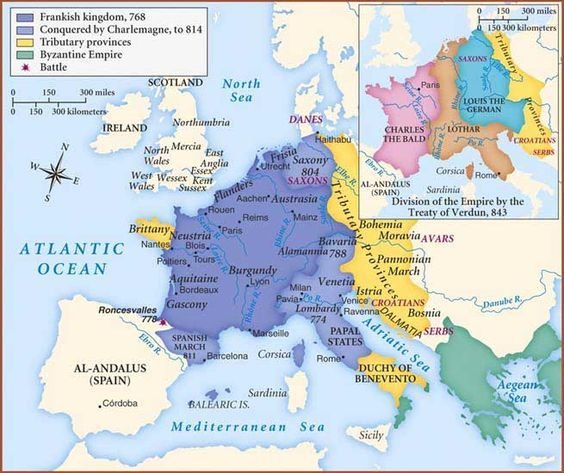
Kingdom of
the Franks
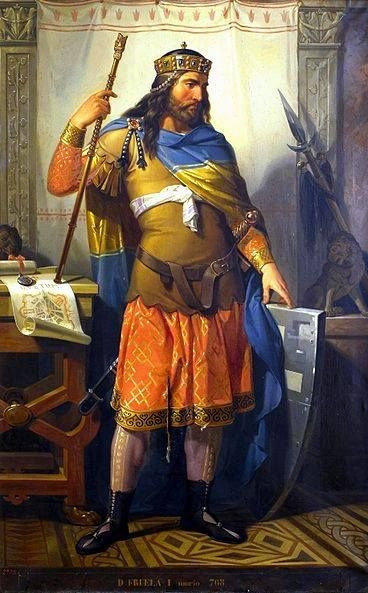
Frankish king were...
very LAZY
so.....
MAYORS OF THE PALACE
ruled the kingdom
The most important was...
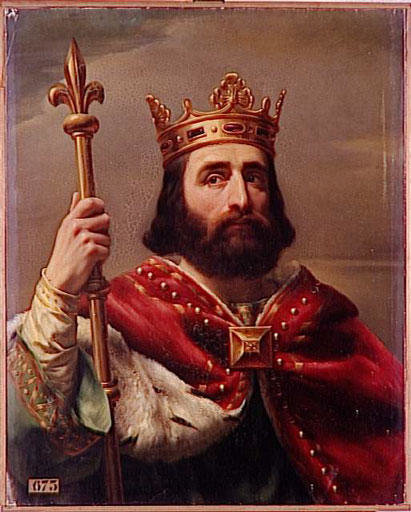

CHARLES MARTEL
(nicknamed - The Hammer)
He stopped the Muslim invasion
of the Frankish Kingdom
in
Battle of Poitiers (732AD)
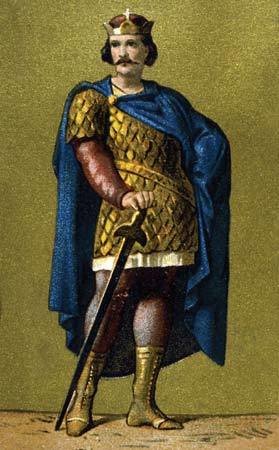
PEPIN The Short
The youngest son of Charles Martel
In 751 - Pope Zachary
crowned him
King of the Franks
The first king of the
Carolingian Dynasty
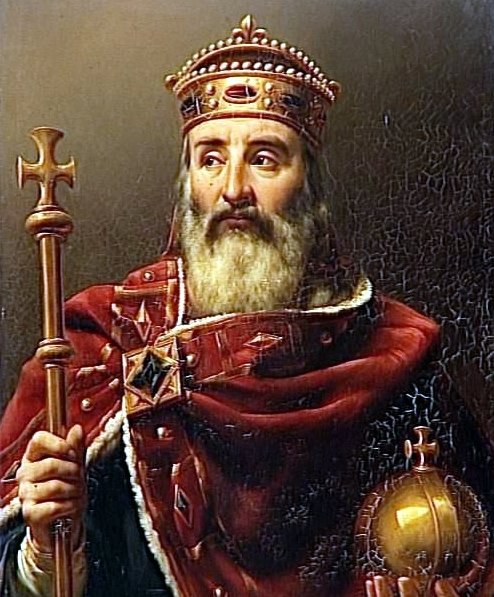
CHARLEMAGNE
Charles Martel's grandson
In 768 - crowned
King of the Franks
He wanted to
restore the
Western Roman Empire
so he...
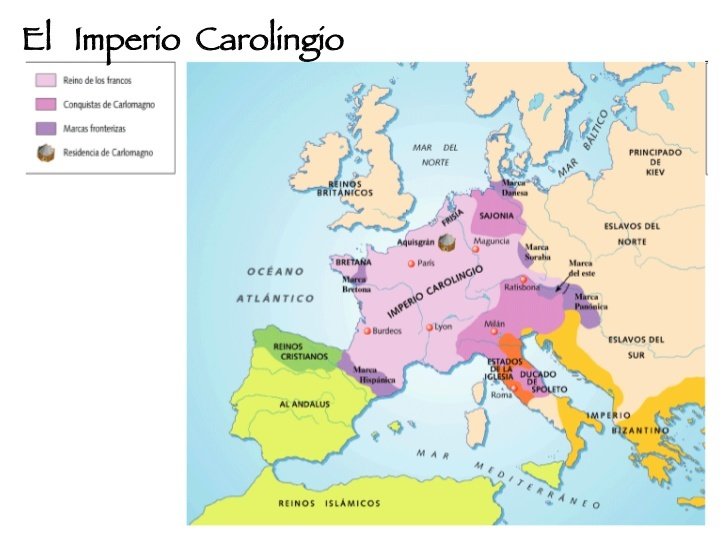
conquered various lands
Text
Carolingian Empire
In 800, Pope Leo III crowned Charlemagne
HOLY ROMAN EMPEROR
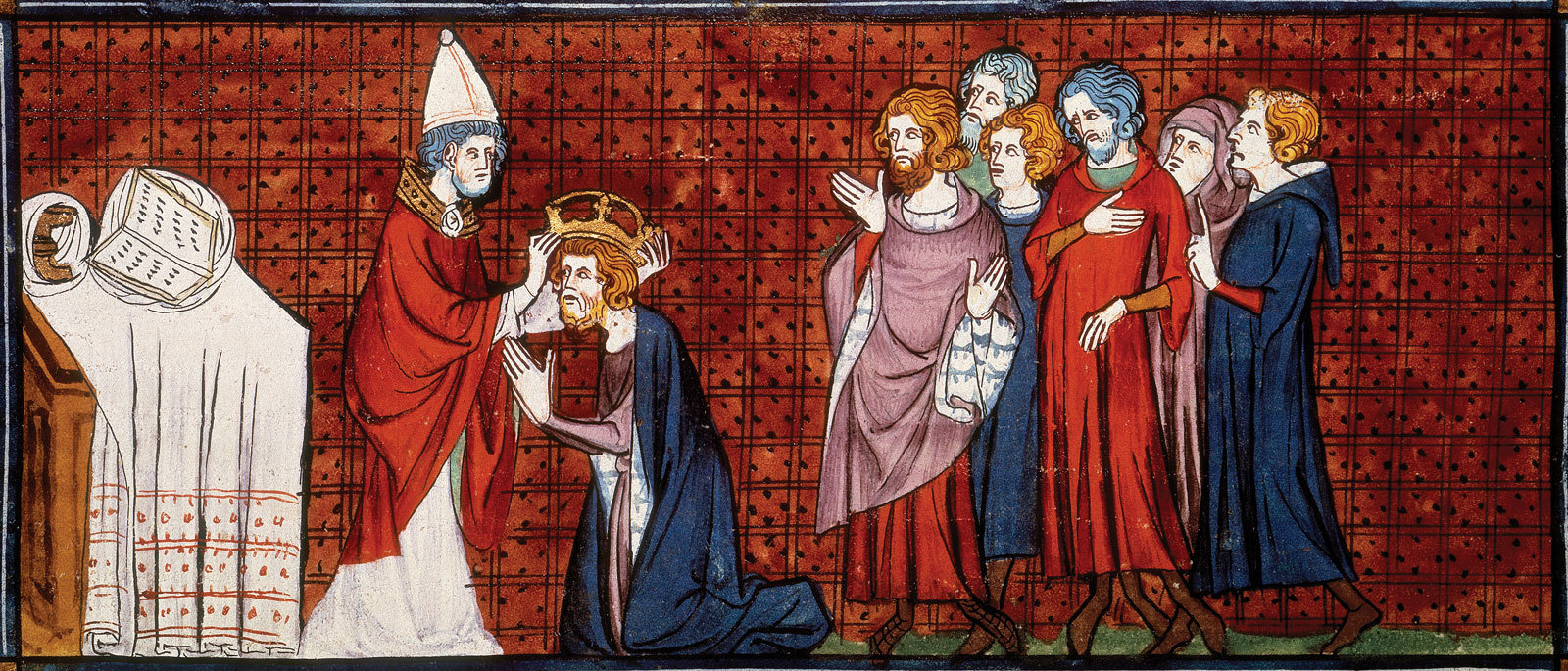
As Holy Roman Emperor CHARLEMAGNE
1) Established MARCHES
to separate the
HOLY ROMAN EMPIRE
from other territories
2) Divided the empire into
COUNTIES
ruled by COUNTS
Treaty of
Verdun
843
Division of the Empire
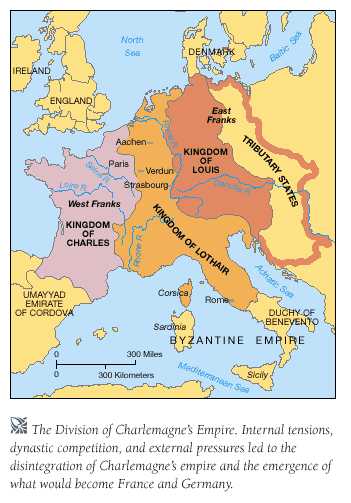
- CHARLES THE BALD
- LOUIS THE GERMAN
- LOTHAIR
Treaty of Verdun in 843
After Charlemagne died
the
Empire divided
between his grandsons

New Invasions
Western Europe was invaded by
VIKINGS, MAGYARS
and SARACENS
9th -10th Centuries
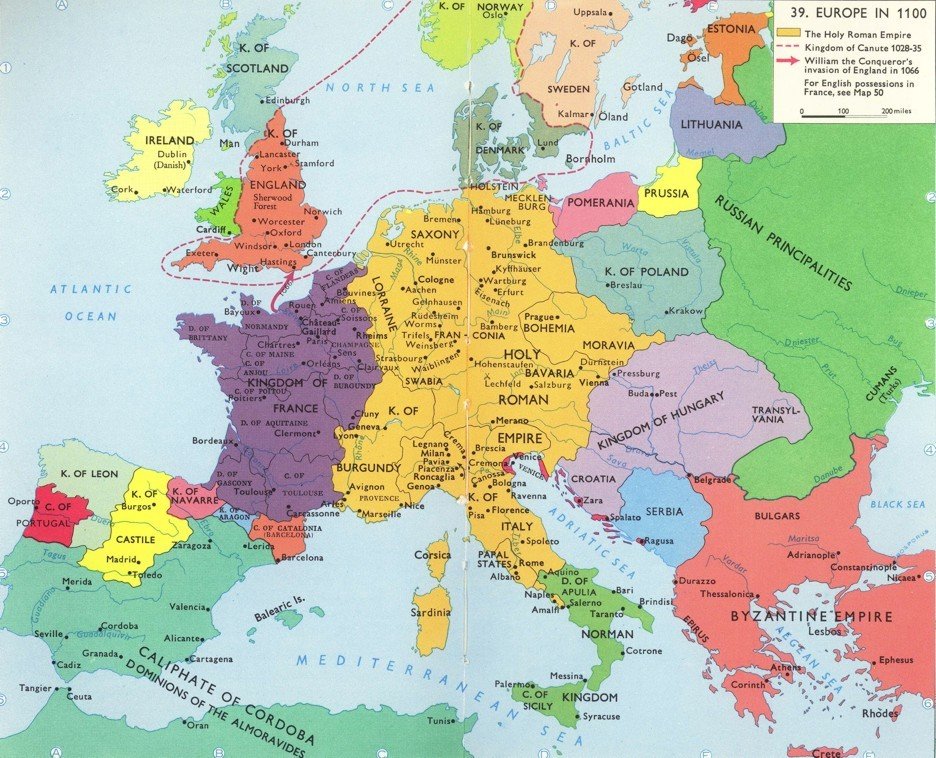
9th and 10th Century
Europe divided but...
Holy Roman
Empire
Kingdom
of
France
Caliphate of
Cordoba
Kingdom
of
Hungry

Christianity
Europe was unified with...
Trade

Social Structure
9th and 10th Century Monarchies lost power
- Didn't control all their terrritory
Kingdoms divided
between king's children
so
smaller, weaker kingdoms
- Didn't have large armies
- Couldn't collect taxes

- Depended on lords/nobility to provide soldiers

Kingdoms
no permanent capital
the CURIA -
(church, officials,
lawyers, noble and soldiers
9th and 10th Century
Monarchies travelled with
the COURT
helped the MONARCHY
rule kingdoms

Feudalism
This new wave of invasions and weak kings caused insecurity and violence
Result...
Networks in
Feudal Society
Nobles offered the kings
protection
with their knights
and soldiers
Kings gave
the Nobility land
called fiefs


Pact of vassalage
in a special ceremony
Lords protected peasants/serfs
in their fiefs and castles
Peasants called serfs
worked on the Lord's fief


Networks in
Feudal Society
FIEF / MANOR
Land the VASSALs (Lords/Knights) received
for allegiance to the King
or Noble with higher rank

Text
This video explains
FEUDALISM - a new social and political system that started in the 9th and 10th Century in Western Europe
1. Explain the agreement/deal that the kings made with the nobles/lords.
a) What did the kings give the nobles
b) What did the nobles give the king
2. Explain the order of society.
3. What role did the peasants have?
4. Why was FEUDALISM a benefit for people during the Middle Ages?
5. Why were castles important
FEUDALISM
Watch the video and answer the questions

Everything on the fief, including the serfs,
belonged to the Lord.
He had
complete authority
King/lord/noble lived here
CASTLE / MANOR HOUSE
Places on a FIEF


Village - where the free peasants lived
Desmesne - part of the fief
only the LORD used
but
peasants worked
Mill - grind grains to make bread
Places on a FIEF
Spinning Wheel / Loom - to make clothes



Well - to get water

Forest - hunting and wood
Plots of land - to grow food
Places on a FIEF
Oven - to cook food



Press - make wine and oil
Places on a FIEF
Blacksmith - a person and place to make tools



Privileged Estates
Three Estates
NOBLES and
KNIGHTS
COMMONERS
SERFS/
FREE PEASANTS
CLERGY
The Nobility
Lower Nobility


Upper Nobility
owned large estates(fiefs)
had titles:
DUKE, COUNT, MARQUIS
Knights -
came from rich families
owned horse and weapons

Provided protection for
the King
or other
richer nobles
Responsible to
defend
the population
Knights
(lower nobility)

A 7 year old boy
from weathly family
went to live with a knight
as his servant and student
PAGE
How to become a knight
Learned to read, sing, fight and play chess
SQUIRE

When he showed that he had learnt everything...
A 15 year old boy
trained with the knight
and helped him.
KNIGHTS

...the SQUIRE became a knight in a special ceremony.
NOBLE WOMEN

- Arranged marriages
- Better educated than men
- Took care of house and children
Unmarried women went to convents
recieved high level
of education

MEDIEVAL KNIGHTS
What were the steps to become
a knight?
Name some of the responsibilities that a squire had?
What was CHIVALRY?
Name some of the WEAPONS and ARMOUR?
What did knights do in TOURNAMENTS?
Watch the video and answer these questions
Life in a Castle
SERFS
Serfs - Not free to leave the fief
Didn't recieve money for work
Received food and shelter for work
Born a serf,
died a serf

WORKERS
Free Peasants
Free to make personal decisions
Owned small pieces of land called plots
Lived in villages
Paid taxes to the lord
to use
the MILL, PRESS and OVEN


Serf's daily work
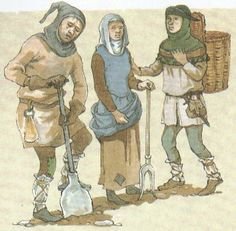


Grew
wheat (trigo)
barley (cebada)
vegetables
Crops


Serf's Agricultural work
Everyone in the family
worked all day long
Typical farming tools
Roman Plough

TWO YEAR ROTATION
No fertiliser to grow food.
GOOD because
the cultivated land more fertile
BAD because
only used half the land
cultivated less food
fallow


A short hard life with a lot of difficulties
Lived in small villages
Houses made of wood and mud
With one room, Very little furniture
Shared the house with the animals
Every day life of a Serf
Self-sufficient:
Cultivated their own food
Made their own clothes
Furniture and houses
CLERGY
Baptism
Marriage
Last Rites
when and where a child was born, his/her name and parents' names
who was married and
who were their children
when a person died, where they were buried
Monks, priests, nuns performed religious functions
and produced important records/archives
about the population. For example...

Lived in monasteries
Isolated from other people
CLERGY
Had political power, economic power
and cultural power
Political Power

Catholic Church
Only church in Western Europe/Christiandom
Could EXCOMMUNICATE the King
King lost all his vassals and became unprotected and weak.
The POPE was the head of the Catholic Church
Economic Power
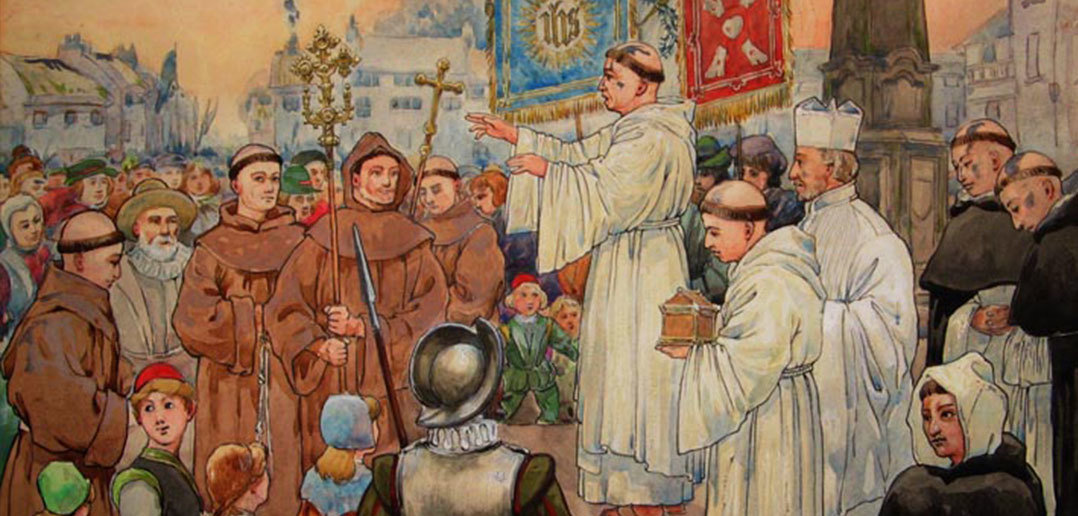
Recieved money and land
Peasants gave some of their harvest (a tithe)
to the Church
Had serfs to do all manual work
Copied and translated ancient written works
Culture

Created manuscripts and copied artwork
in the scriptorium
Beginning of new social, political and economic structure called FEUDALISM
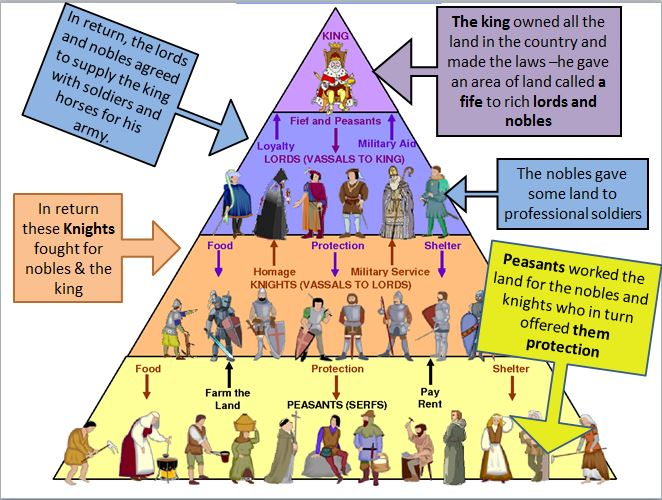
CLERGY
Spread of Christianity
in the 11th-13th century
CURSADES
Military expeditions to recover JERUSALEM from the Muslims
TEMPLARES
Military orders
of monks and knights
that fought against
the Muslims
